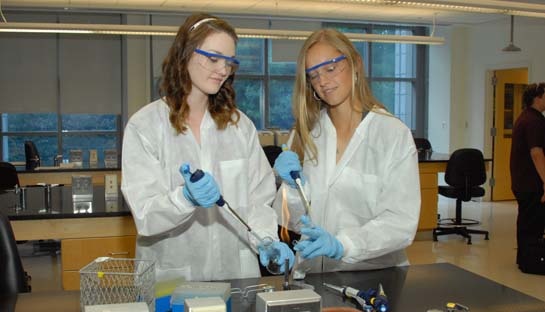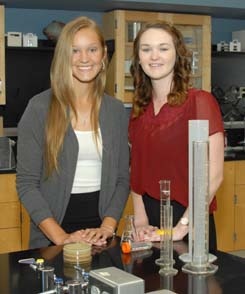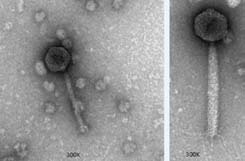 Katrina Terry and Haley Broomell demonstrate the kind of lab procedure that they used during bacteriophage research this summer. |
Imagine two young women, about to enter their sophomore years in college, who devote the better part of their summer to doing scientific research on phages, viruses that infect bacteria.
 |
|
|
Both students are from New Jersey, Haley from Newfield and
Katrina from Laurel Springs. |
|
 |
|
|
Images of the two viruses Katrina researched -- side by side and magnified 300,000 times. On the left
is the lake phage she named HunterDalle after her high school biology and Latin teachers at Sterling High School. |
They collect soil from under trees and near lakes (because goose droppings increase the likely presence of arthrobacter bacteria), find and filter out the phages that are present, and then study phage anatomy and life cycles. To personalize the work, they name the various phages they find: Stratus, Princess Trina, Wolverine and Swatter.
Welcome to the world of Katrina Terry and Haley Broomell, Neumann University students who know more about phages than most of their peers know about the Kardashian sisters. Haley gushed about the Cabrini College course at the July 24 Summer Undergraduate Research Colloquium, where she, Katrina and other members of the seven-person research team presented their findings.
"I learned lab technique, perseverance, and how to think like a scientist," she explained.
Katrina agreed. "I learned about trial and error, and that mistakes might not always be a bad thing." She made an error one day in the lab, but the teaching assistant suggested that she continue the process to see the results. It turned out that her "mistake" improved the protocol for that part of the research.
Thousands of varieties of phage exist, each of which may infect one or a few types of bacteria. According to Dr. David Dunbar, the professor for the course, only 82 types of arthrobacter phages were known before this summer. His seven students isolated 23 more, increasing the number of identified arthrobacter phages by 28%.
The experience also confirmed career paths for Katrina and Haley, both biology majors in Neumann's Clinical Laboratory Science (CLS) track. Haley admits that she chose CLS because the major provides a clear pathway to a growing job market. Still, she confessed to having some angst before the summer research course because she “wasn’t sure how much she would like it.”
What happened, in fact, was that both students found their passion. They now know that they can spend hours in a lab, enjoy the work, and be eager for more.
As for the practical applications of knowing more about phages, Katrina pointed out that "phages kill half the bacteria in the oceans every day" and Haley noted that "phage therapy can be used to kill harmful bacteria that affect crops."
Bacteriophages (the full name for phages) may also have therapeutic potential for treating humans. Katrina explained that research with phages to treat human bacterial diseases was abandoned decades ago with the advent of antibiotics. With the recent rise of drug-resistant bacteria, however, phages are receiving more scientific attention for possible medical uses.
The class was a pilot course, made possible through the generosity of presidents and chief academic officers at colleges that are part of the Southeastern Pennsylvania Consortium for Higher Education (SEPCHE) with financial support from the consortium. Members of SEPCHE's STEM faculty workgroup developed this summer undergraduate research experience and nominated students for the class.
SEPCHE members are Arcadia University, Cabrini College, Chestnut Hill College, Gwynedd Mercy University, Holy Family University, Immaculata University, Neumann University, and Rosemont College.
According to Beth Moy, executive director of SEPCHE, “Special thanks are owed to Professor David Dunbar, Peer Mentor Trevor Cross and administrators within Cabrini College for their support and coordination. The PHAGE course is a tremendous example of what is possible when faculty, staff and administrators combine efforts to advance student learning.”
 CHALLENGE
CHALLENGE





